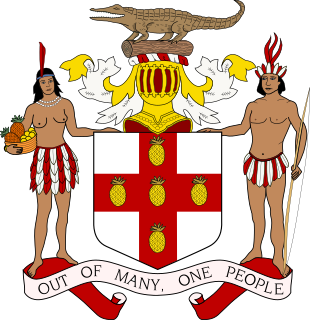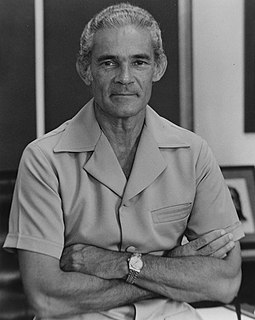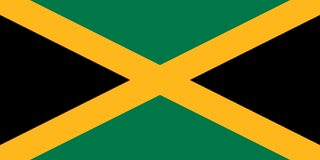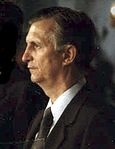
Politics in Jamaica takes place in the framework of a representative parliamentary democratic constitutional monarchy. The 1962 Constitution of Jamaica established a parliamentary system whose political and legal traditions closely follow those of the United Kingdom. As the head of state, Queen Elizabeth II - on the advice of the Prime Minister of Jamaica - appoints a governor-general as her representative in Jamaica. The governor-general has a largely ceremonial role. Jamaica constitutes an independent Commonwealth realm.

Michael Norman Manley ON OCC was a Jamaican politician who served as the fourth Prime Minister of Jamaica from 1972 to 1980 and from 1989 to 1992. Coming from a prosperous background, Manley was a democratic socialist. According to opinion polls, he remains one of Jamaica's most popular prime ministers.

The Prime Minister of Jamaica is Jamaica's head of government, currently Andrew Holness. Holness, as leader of the governing Jamaica Labour Party (JLP), was sworn in as Prime Minister on 3 March 2016, succeeding People's National Party (PNP) leader Portia Simpson-Miller. This was a result of the JLP's victory in Jamaica's 25 February 2016 general election.
The Jamaica Labour Party (JLP) is one of the two major political parties in Jamaica, the other being the People's National Party (PNP). While its name might suggest that it is a social democratic party, the JLP is actually a conservative party. However, it has longstanding ties to the Jamaican labour movement.

Orette Bruce Golding is a former Jamaican politician who served as eighth Prime Minister of Jamaica from 11 September 2007 to 23 October 2011. He is a member of the Jamaica Labour Party which he led from 2005 to his resignation in 2011.

Elections in Jamaica provides information on elections and election results in Jamaica.

Portia Lucretia Simpson-Miller,, is a Jamaican politician. She served as Prime Minister of Jamaica from March 2006 to September 2007 and again from 5 January 2012 to 3 March 2016. She was the leader of the People's National Party from 2006 to 2017 and the Leader of the Opposition twice, from 2007 to 2012 and from 2016 to 2017.

Early general elections were held in Jamaica on 15 December 1983. The election was boycotted by the main opposition party, the People's National Party, in protest at the refusal of the ruling Jamaican Labour Party to update the electoral roll. Whilst several minor parties participated in the election, most seats were unopposed: in the six seats where voting took place, voter turnout was about 55%, so this translated into a nationwide figure of 2.7%. It allowed the Labour Party to win all 60 seats in the House of Representatives, with their leader, Edward Seaga, continuing as Prime Minister.

General elections were held in Jamaica on 18 December 1997. The ruling People's National Party of Prime Minister P. J. Patterson won 50 of the 60 seats defeating the main opposition Jamaica Labour Party.

The Cabinet of the Government of Jamaica is the ultimate decision-making body of the executive within the Westminster system of government in traditional constitutional theory. The Cabinet of Jamaica is the principal instrument of government policy. It consists of the Prime Minister, and a minimum of thirteen other Ministers of Government, who must be members of one of the two Houses of Parliament. Not more than four members of the Cabinet may be members of the Senate. The Minister of Finance must be an elected member of the House of Representatives. The Shadow Cabinet of Jamaica is seen as the alternative to the Cabinet of Jamaica, led by the Leader of the Opposition (Jamaica), and is charged with fairly criticizing and providing alternative policy to that proposed by the Government.

General elections were held in Jamaica on 9 February 1989. The result was a victory for the People's National Party, which won 45 of the 60 seats. Voter turnout was 78.4%.

Jamaica–Mexico relations refers to the diplomatic relations between Jamaica and Mexico. Both nations are members of the Association of Caribbean States, Community of Latin American and Caribbean States, Organization of American States and the United Nations.

Andrew Michael Holness, ON, MP is a Jamaican politician who has been the Prime Minister of Jamaica since 3 March 2016, following the 25 February 2016 general election. Holness previously served as Prime Minister from October 2011 to January 5, 2012. He succeeded Bruce Golding as Prime Minister, and decided to go to the polls in the 29 December 2011 general election in an attempt to get his own mandate from the Jamaican electorate. He failed in that bid, however, losing badly to the People's National Party led by Portia Simpson-Miller, with the PNP gaining 42 seats to the Jamaica Labour Party's 21. Following that defeat, Holness served as Leader of the Opposition from January 2012 to March 2016, when he once again assumed the position of Prime Minister.

The Leader of Her Majesty's Opposition in Jamaica is the leader of the largest political party which has not formed the current government. The Leader of the Opposition is seen as the alternative Prime Minister and leads the Shadow Cabinet of Jamaica. As of January 2012, Jamaica has had no Leader of the Opposition who has not also served as Prime Minister. P. J. Patterson and Donald Sangster are the only two of Jamaica's nine Prime Ministers who has not also served as Leader of the Opposition.
Seymour St. Edward "Foggy" Mullings OJ CD was a Jamaican politician, who served as Deputy Prime Minister under P. J. Patterson. He was also an accomplished pianist.
Floyd Emerson Morris is a former Jamaican politician from the People's National Party. He was the 11th President of the Senate of Jamaica. Morris, who began losing his sight during high school and lost it fully six years later, became the first blind member of the Senate when he was appointed in 1998.

Federal elections were held in the West Indies Federation for the first and only time on 25 March 1958. The result was a victory for the West Indies Federal Labour Party, which won 25 of the 45 seats in the House of Representatives.

Republicanism in Jamaica is a position which advocates that Jamaica's system of government be changed from a constitutional monarchy to a republic. Both major political parties – the Jamaica Labour Party and the People's National Party – subscribe to the position, and the current Prime Minister of Jamaica, Andrew Holness, has announced that transitioning to a republic will be a priority of his government.











